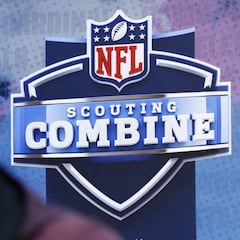Inside the NFL Scouting Combine: Behind the history and origins of football’s ultimate selection event
At the combine, it feels like a combination of track and field, with a pop quiz element added to test the skills of future players.

The NFL Combine is an annual event that plays a crucial role in choosing players in the National Football League. Understanding the origins and evolution of this event gives us a better appreciation of its significance in player development and the NFL’s history.
The Birth of the NFL Scouting Combine
This four-day, invitation-only event serves as the Super Bowl of player evaluation, allowing scouts to scrutinize the top college prospects across a spectrum of medical, mental, and physical criteria.
The combine has come a long way and when it started in 1982 it was a far cry from the spectacle it is today. Until then, NFL teams typically relied on physical exams for potential draft picks. It wasn’t until later that teams invited college seniors for physical exams and interviews. This strategic move proved advantageous, with the Jets, who were forerunners in the evaluation of players, boasted remarkable draft success rate in subsequent years.
The beginnings of the NFL Scouting Combine
The Jets’ innovative approach soon caught the attention of rival teams, sparking a trend that revolutionized the pre-draft evaluation process. By the early 1980s, teams across the league were following suit, conducting comprehensive physical examinations and interviews with draft prospects. This marked a paradigm shift as clubs recognized the value of mitigating risks and maximizing their draft investments.
As more teams adopted similar practices, logistical challenges and inefficiencies emerged. Traveling from city to city for interviews and physicals proved arduous and costly for both teams and players. In response, Tex Schramm, the president and general manager of the Dallas Cowboys, proposed centralizing the evaluation process—a move that would lay the groundwork for the modern combine. In 1982, three separate organizations—National Football Scouting Incorporated (NFS), Blasto, and Quadra Scouting—were conducting camps to collect information for NFL teams. Recognizing the need for collaboration, these entities merged their efforts, with NFS emerging as the primary coordinator of the centralized event.
The Rise of the Modern Combine
With NFS at the helm, the NFL Combine as we know it began to take shape. The inaugural national invitational camp in Tampa, Florida 1982 laid the groundwork for future iterations, paving the way for a more streamlined and comprehensive evaluation process. Subsequent years saw the event evolve, with Phoenix and New Orleans hosting before the combine found its permanent home in Indianapolis in 1987. It might have something to do with merging the three camps into one or something to do with the athletes’ presentation of various skills and abilities and what stood out as the reason for the name NFL Combine.
Panthers HC Frank Reich at the 1985 NFL Combine pic.twitter.com/kBoFun4vz6
— John Ellis (@1PantherPlace) February 5, 2023
Related stories
In the digital age, technology has become an indispensable tool in coordinating the combine’s myriad logistics. From scheduling interviews to collecting and sharing data, modern innovations have streamlined the process, ensuring a seamless experience for teams, players, and organizers alike.
For aspiring NFL players, the combine represents a gateway to their dreams, offering a platform to showcase their talents on a national stage. While medical evaluations and interviews take precedence, physical drills, and tests are crucial in shaping teams’ perceptions of prospects. As the NFL landscape evolves, so too does the combine. Each year brings new advancements and refinements as organizers strive to enhance the event’s effectiveness and relevance. From additional medical assessments to expanded opportunities for player evaluation, the combine remains a dynamic and integral component of the league’s talent acquisition process.

